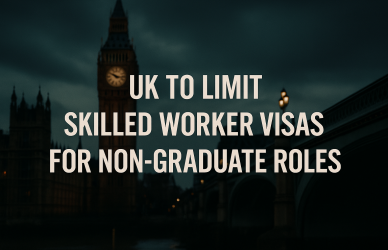The UK government is preparing to implement stricter visa regulations targeting nationals from countries with elevated asylum claim rates — including Pakistan, Nigeria, and Sri Lanka. This is part of a broader strategy to manage net migration, which recently hit a record 728,000 in the year leading up to June 2024.
Officials at the Home Office are expected to release a detailed strategy in the upcoming Immigration White Paper, aimed at addressing what ministers describe as vulnerabilities in the visa and asylum system.
Why These Countries?
While the UK does not routinely publish data identifying the nationalities of individuals who apply for asylum after arriving on temporary visas, government sources say people from Pakistan, Nigeria, and Sri Lanka are more likely to transition from student, work, or visitor visas to asylum claims.
Home Office data shows that in 2023, approximately 108,000 people applied for asylum in the UK — and around 16,000 of those individuals originally entered on student visas. Officials argue these patterns indicate potential abuse of the visa system.
A Home Office spokesperson noted:
“We are increasing our capacity to identify abuse earlier, using intelligence to detect trends that undermine the integrity of our immigration rules. Our forthcoming White Paper will outline comprehensive reforms to bring greater control and fairness to the system.”
You can explore current visa types and eligibility criteria on the UK Visas and Immigration (UKVI) website.
Labour Responds to Migration Pressure
Following poor local election results, Labour, under Prime Minister Keir Starmer, is feeling political pressure to demonstrate a firmer stance on migration. Labour MPs have urged faster, more decisive reforms. Jo White MP commented that the government must stop “pussyfooting around” and address migration challenges head-on.
Labour’s focus aligns with broader public concerns over immigration, especially in communities affected by rapid demographic changes.
To learn more about asylum claims UK procedures and statistics, visit UK asylum support and data.
Recent Changes Already Affecting Visa Numbers
Recent rule changes appear to be having an impact. In the year to March 2025, visa applications across key categories — including work, study, and family — declined by 37% compared to the previous year.
Key changes included:
- Bans on overseas care workers and international students bringing dependants
- Increases to the skilled worker salary threshold, now set at £38,700
(Read more on Skilled Worker visa requirements)
These measures reflect a growing push to prioritise domestic workforce development and reduce reliance on foreign labour, particularly in sectors like care and hospitality.
Balancing Border Control With Economic Needs
Despite the tightening of rules, ministers are under pressure from businesses and universities that depend on international workers and students. Sectors such as healthcare and higher education argue that a rigid visa regime could create labour shortages and harm the UK economy.
The government insists its upcoming immigration policy reforms will strike a balance between securing borders and supporting growth.
For the most current guidance on immigration and nationality policy, visit the Home Office Immigration and Borders page.
What’s Next?
The full scope of reforms will be revealed in the Immigration White Paper, expected in the coming days. It’s set to propose sweeping changes aimed at reshaping a system critics have long described as “broken.” Many of the reforms echo earlier policies under the former Conservative government, which took a similarly tough stance.
To keep up with official updates, see the UK government’s central hub for immigration news and announcements at: www.gov.uk/government/news.
READ MORE:
- Youth Mobility Scheme Uk:Fresh Opportunity for Young EU Workers and Students?
- UK Work Visa Sponsorship: Eligibility and Application Guide
- Unskilled Jobs in the UK with Visa Sponsorship: Find Your Next Opportunity





